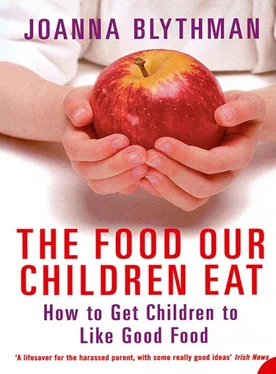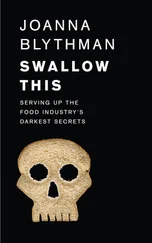‘I am relying on childcarers to feed my child on weekdays. It’s hard to control what the children eat .’
This is not an insurmountable problem. Read What You Can Expect from Childcarers, pages 169–75.
‘ I’d like the children to eat better but when I try, I find it hard to keep it up .’
Like anything else you really want to do, encouraging children to have good, wide-ranging eating habits does require some staying power and commitment. Parts Two and Three outline various ways to overcome common pitfalls and hurdles.
‘ Even if my children eat well at home, I meet a brick wall at school/nursery where junk is accepted as normal .’
The food that children eat at home is going to be the most formative type they get and you can largely control that. Don’t worry too much about what goes on outside the house but read Part Five, Influencing What Children Eat When You’re Not There, for solutions in outside situations.
‘ How can I make my kids eat well without making both them and myself stand out as weird and awkward ?’
Explain to children from an early age why they eat some food and not others so that they understand and feel confident about that. Prepare them diplomatically for situations outside the house where they will be making a different choice from other children in the group. Part Five, Influencing What Children Eat When You’re Not There, suggests how you can do that.
‘ If I take a tough line on junk and restrict it, won’t that make them react and go the wrong way ?’
There’s so much commercial pressure on children to eat junk that if you don’t take a stand they will almost certainly conform to that pressure. Children need to hear an overt ‘real-food’ message. However, it is important not to get involved with ‘banning’ foods or appearing to deprive children of treats. Part Two, Breaking the Mould at Home, Part Three, The Gentle Art of Persuasion, and pages 91–5, Sweets, Treats and Bans, all explain how to get that balance.
‘ No matter how hard I try, my children reject food and I can’t stand the fights any more .’
Head-on confrontations are a no-no. Perhaps you’re going about it in the wrong way. Read Part Three, The Gentle Art of Persuasion.
‘ Children are picky eaters naturally, it’s to be expected .’
A self-fulfilling prophecy that has been promoted by the food industry, which makes a mint out of selling children junk. Children in most parts of the world eat what adults eat. It’s mainly in the UK and North America that children are considered to need a different diet. If you keep on presenting them with real food they will learn to like it. If you stereotype them as picky eaters, then that is what they will become.
‘ Better the kids eat junk than nothing at all .’
This is very short-term thinking. The more you offer children junk, the less likely they’ll be to accept real food in the long term. Part Three, The Gentle Art of Persuasion, suggests how to encourage children to eat something decent without having head-on fights. Children won’t starve; they will eventually eat something worthwhile if you adopt the approach outlined in Part Two, Breaking the Mould at Home.
‘ It’s okay to eat junk as long as they exercise .’
Children can burn up a lot of energy and work off an unhealthy diet to a certain extent, but however fit and active they might appear, they are being deprived of vital nutrients if they live on junk. Children brought up on junk will very likely turn into adults who may be less physically active. These unbalanced eating habits will catch up with them in later life. They need to learn wide-ranging and wholesome eating patterns which will see them through into a ripe old age.
‘ Surely in moderation junk is okay ?’
In theory, if a child eats well generally then the odd packet of sweets or crisps is not a problem. But it is very easy for the proportion of junk to creep up so that it is actually much more significant in their total diet than parents realise. And how do you draw the line between moderate amounts of junk and too much? A better approach is to say that, in general, children aren’t given junk foods except on the very odd occasion and that they are always offered an attractive alternative. For ideas read Part Eight, Nitty-Gritty Ideas and Recipes for Inspiration.
The parent who accepts junk food
‘ I’m not worried. The kids will learn to like better food as adults. After all, I did .’
It is theoretically possible that a child will spontaneously find a love of good food as an adult but it is much more likely that he or she will simply become an adult who lives on junk. It’s true that parents generally eat more adventurously than their children, but adults with sophisticated tastes may have forgotten that their diet as children, though limited, was nowhere near as limited as the modern child’s, and that they ate with adults, not apart.
‘ Good food is wasted on children .’
Another self-fulfilling prophecy. Children learn to like what they are given. If they are given only junk, then this is what they will learn to like and expect. If you follow this approach to its logical extreme, you will only ever feed your children on processed junk. Is that what you really want? Besides, it’s vital that children learn to like real food if they are to be properly nourished – so rather than being wasted on them it’s a priority that they have it.
‘I don’t have time to feed my kids on anything but processed children’s foods, and communal eating doesn’t ft in with our lifestyle .’
Fine, but can you live with the fact that your children will end up living on an imbalanced diet which will not provide the nutrients they need? It isn’t necessarily any more time-consuming to give them real food in any case.
‘ It’s normal for children to eat junk. They nearly all do and they aren’t dead yet .’
This phenomenon is widespread only in the UK and North America. Children in other countries still overwhelmingly eat real food. A large body of scientific research now suggests that a diet high in fat, protein, salt and sugar and deficient in fruit and vegetables (the typical ‘children’s diet’) is implicated in health problems that attack us in adult life – cancer, heart disease, diabetes etc.
THE ROT BEGINS WITH THOSE LITTLE JARS
When we try to trace the origins of how children’s diet became the junk-food ghetto that it is today, the trail starts with the modern idea that their food should somehow be separate from the general food supply. This mindset kicks in with baby food.
Baby-food manufacturers assure parents that their products are ‘specially formulated for your baby’, but such foods would be more accurately described as ‘specially formulated to con parents into believing that they can’t feed children by themselves’. This hidden agenda, of course, is never made explicit.
Nowadays, manufacturers realise that they must pay lip service to the idea that their baby foods are not intended to replace home-prepared food and that they are just a safe, handy convenience for the ‘busy mum’. But by clever labelling, which first raises anxieties then appears to allay them, they implicitly perpetuate the false idea that parents somehow lack the nutritional knowledge to prepare baby food themselves. They undermine our confidence about feeding our babies on variations of the household food supply that we ourselves eat, even though this was, after all, the common-sense and highly practical way that parents fed their children until quite recently.
Читать дальше











